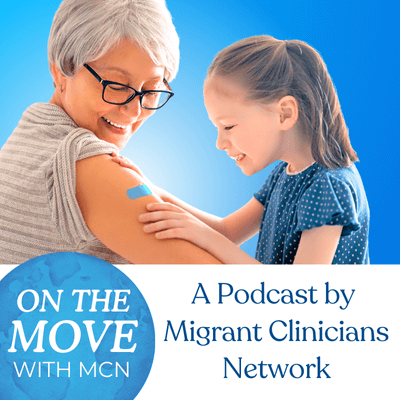In the Field: Occupational Health for Farmworkers in Kansas

This week, MCN’s Amy K. Liebman, MPA, MA, Director of Environmental and Occupational Health, and Candace Kugel, FNP, CNM, Specialist in Clinical Systems and Women’s Health headed to Topeka, Kansas to lead an Introduction to Environmental and Occupational Health training, the first training in a yearlong collaboration to integrate a focus on environmental and occupational health into Kansas primary care and its Statewide Farmworker Program.
In this first round of training, MCN worked with 12 case managers, promotores, and administrators with the Kansas Statewide Farmworker Health Program, a voucher program housed in the Kansas Department of Health and Environment that facilitates access to care for agricultural workers and their families.
“Of those 12, at least six talked about their own or family members’ experiences in farm work, so they are remarkably tuned into the population and their health care needs,” said Kugel. The in-person introductory course included information on occupational and environmental health incidence, specific risks associated with agricultural work, and the role of health care workers in educating patients and managing work-related illnesses and injuries. Numerous resources were provided.
The Kansas farmworker community is spread out throughout the state, and is diverse. Roughly 22 percent of the Kansas farmworker patient population are low speaking German Mennonites, mostly located in the western part of the state. Most of these farmworkers lived and farmed in Mexico before immigrating to the United States. Many are undocumented, and most do not speak Spanish. “This presents some interesting challenges culturally and linguistically for the program,” Kugel noted, including when addressing occupational health concerns.
“All of the training participants recognized the importance of addressing environmental and occupational health for the patient population,” noted Liebman, adding that they were familiar with many of the hazards of farm work and resulting illnesses. “They were excited to initiate the partnership with MCN and have a program dedicated to improving the recognition and management of environmental and occupational health conditions.”
The training was the first step for the Kansas Statewide Farmworker Health Program to become a Center of Excellence in Environmental and Occupational Health. The trainings are part of MCN’s Workers and Health program, supported by the Environmental Protection Agency. MCN’s Centers of Excellence complete a one-year program of on-site training and technical assistance to develop simple, practical, and flexible adaptations to integrate environmental and occupational health into their primary care setting. Currently, 14 health centers in the US and Puerto Rico have been designated as Centers of Excellence.
Simultaneously, hundreds of miles away in Puerto Rico, Corporación de Servicios Médicos, participated in its second training in the Workers and Health program. This week’s session, focused on pesticide exposures, was led by Jose Rodriguez, MD, Hospital General Castañer’s Medical Director and a regional expert in the clinical recognition and management of pesticide exposures. Visit MCN’s Facebook or Twitter to check out a slideshow of the Puerto Rico training.
Photos from the training:






Like what you see? Amplify our collective voice with a contribution.
Got some good news to share? Send it to us via email, on Facebook, or on Twitter.
Return to the main blog page or sign up for blog updates here.
Can you help prevent a death? Tomorrow’s Webinar: Community Health Workers Can Make a Difference in Helping People Stay Safe and Healthy on the Job
[Editor’s Note: Learn more about tomorrow’s webinar and all our upcoming webinars on our Upcoming Webinar webpage.]
Two weeks ago, the Occupational Safety and Health Administration (OSHA) issued a citation against Woda Construction for failing to prevent the death of worker Kevin Purpura, who fell several stories down an elevator shaft. OSHA determined that the company had failed to guard its worker against a fatal fall. This death was not an accident. Had Woda Construction and its workers adhered to the safety regulations, Purpura would have been protected from falling by the required “personal fall arrest systems, covers, or guardrail systems erected around such holes.”
In 2014, around 5,000 people died on the job, and another 50,000 died of occupational diseases. Were these deaths “accidents”? In many cases, occupational injuries and deaths occur when health and safety guidelines have not been followed.
Much of the work needs to be done at the jobsite. But we in the health community can prevent injury and death as well. MCN’s Amy Liebman, MPA, MA, Director of Environmental and Occupational Health, joins Wilson Augustave, member of MCN’s Board of Directors and Senior HIV Case Manager at Finger Lakes Community Health in tomorrow’s webinar, entitled, “Community Health Workers Can Make a Difference in Helping People Stay Safe and Healthy on the Job.” Participants will dive into the role of CHWs in empowering workers to know their rights. Liebman and Augustave will also cover what to do when we find out that a patient is working in an unsafe work environment, by covering federal and local regulatory bodies that protect workers on the job. Participants will come away with resources and knowledge to help prevent future deaths.
Join us:
Community Health Workers Can Make a Difference in Helping People Stay Safe and Healthy on the Job
Presented by Amy Liebman, MPA, MA, Director of Environmental and Occupational Health, Migrant Clinicians Network, and Wilson Augustave, Member of MCN’s Board of Directors and Senior HIV Case Manager at Finger Lakes Community Health
Wednesday, August 17, 2016 at 1 pm ET
Learn more and register on our Upcoming Webinars webpage.
- Log in to post comments






